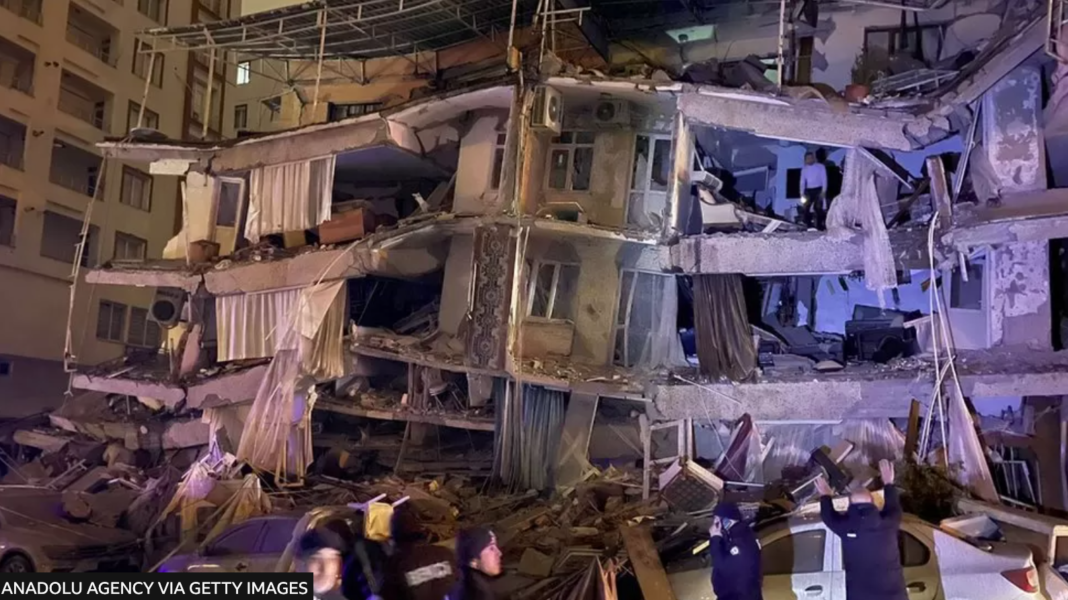The death toll from a strong earthquake in south-eastern Turkey, near Syria’s border, could rise eight-fold, the World Health Organisation has warned, reports BBC on February 2023.
The toll, which currently stands at more than 2,600 people, has increased rapidly since the first earthquake struck early on Monday morning.
About 12 hours later, a second powerful tremor hit further north.
Rescuers have been combing through mountains of rubble in freezing and snowy conditions to find survivors.
Countries around the world are sending support to help the rescue efforts, including specialist teams, sniffer dogs and equipment.
The US Geological Survey said the 7.8 magnitude tremor struck at 04:17 local time (01:17 GMT) at a depth of 17.9km (11 miles) near the city of Gaziantep.
Seismologists said the first quake was one of the largest ever recorded in Turkey. Survivors said it took two minutes for the shaking to stop.
The second quake had a magnitude of 7.5, and its epicentre was in the Elbistan district of Kahramanmaras province.
An official from Turkey’s Disaster and Emergency Management Authority said it was independent of the earlier tremor and not an aftershock.
The death toll in Turkey has exceeded 1,650, while some 1,000 are confirmed to have died in Syria.
The WHO has warned that those numbers are likely to increase as much as eight times, as rescuers find more victims in the rubble.
« We always see the same thing with earthquakes, unfortunately, which is that the initial reports of the numbers of people who have died or who have been injured will increase quite significantly in the week that follows, » the WHO’s senior emergency officer for Europe, Catherine Smallwood, told AFP.
Ms Smallwood added that the snowy conditions will leave many people without shelter, adding to the dangers.
Read also Latest updates as death toll rises in Turkey and Syria
Read also The eyewitnesses who captured the quake on social media
Read also Why were the earthquakes in Turkey so deadly?
Turkey lies in one of the world’s most active earthquake zones.
In 1999 a deadly quake killed more than 17,000 in the north-west. The country’s worst earthquake disaster was in 1939 when 33,000 people died in Turkey’s eastern Erzincan province.
One Kahramanmaras resident, Melisa Salman, said living in an earthquake zone meant she was used to « being shaken », but Monday’s tremor was « the first time we have ever experienced anything like that ».
« We thought it was the apocalypse, » she said.
Many thousands of people have been injured – with at least 9,700 people hurt in Turkey and 2,000 in Syria. Those numbers have also been steadily rising.
Many of the victims are in war-torn northern Syria, where millions of refugees live in camps on both sides of the Syria-Turkey border. There have been dozens of fatalities reported in rebel-held areas.
Thousands of buildings have collapsed, and several videos show the moment they fell, as onlookers ran for cover. Many buildings that were four or five storeys high are now flattened, roads have been destroyed and there are huge mountains of rubble as far as the eye can see.
Among the buildings destroyed was Gaziantep Castle, an historic landmark that has stood for more than 2,000 years.
And a shopping mall in the city of Diyarbakir collapsed, a BBC Turkish correspondent there reported.
Turkey’s energy infrastructure has also been damaged, and videos have emerged showing large fires in southern Turkey. Social media users claimed they were caused by damage to gas pipelines.
Turkey’s energy minister Fatih Donmez confirmed there had been serious damage to the infrastructure, but did not mention the explosions.
The Turkish Red Crescent has called for citizens to make blood donations, and the organisation’s president, Kerem Kınık, said on Twitter that additional blood and medical products were being sent to the affected region.
Following an international appeal for help, Turkey’s President Erdogan said 45 countries had offered support.
UN Secretary General António Guterres has called for an international response to the crisis, saying that many of the families hit by the disaster were « already in dire need of humanitarian aid in areas where access is a challenge ».
The European Union is sending search and rescue teams to Turkey, while rescuers from the Netherlands and Romania are already on their way. The UK has said it will send 76 specialists, equipment and rescue dogs.
France, Germany, Israel, and the US have also pledged to help. Russian President Vladimir Putin has offered help to both Turkey and Syria, as has Iran.
Turkey’s interior minister, Suleymon Soylu, said 10 cities were affected by the initial quake including Hatay, Osmaniye, Adiyaman, Malatya, Sanliurfa, Adana, Diyarbakir and Kilis.
School has been suspended in those cities for at least a week.
A volunteer with the White Helmets rescue group, which operates in rebel-controlled areas of north-western Syria, fought back tears as he described the devastation in Sarmada, near the border with Turkey.
« Many buildings in different cities and villages in north-western Syria collapsed, » he told the BBC.
« Still now, many families are under the rubble. We are trying to save them but it’s a very hard task for us.
« We need help. We need the international community to do something, to help us, to support us. North-western Syria is now a disaster area, » he added.
The earthquake was powerful enough to be felt as far away as Cyprus, Lebanon and Israel.
BBC, February 6, 2023.

